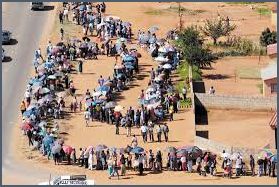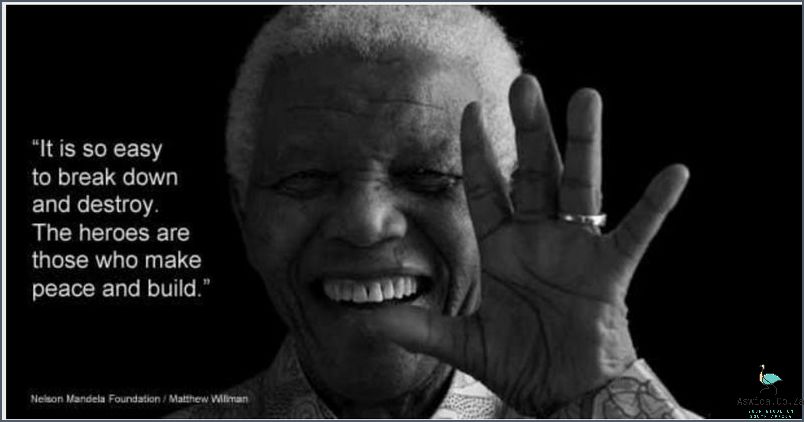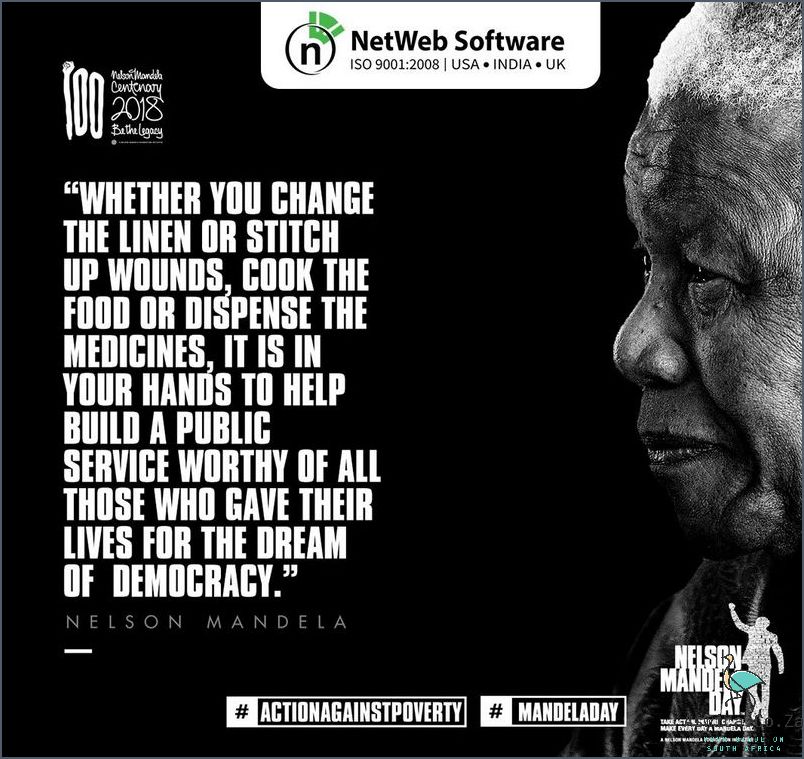
The end of apartheid in South Africa was a historic achievement, and many people and organisations helped to build democracy in the country. The process of dismantling the apartheid system began in the early 1990s, with the release of Nelson Mandela from prison in 1990 and the start of negotiations between the African National Congress (ANC) and the National Party (NP). This process was supported by a wide range of international, regional and local actors, including the United Nations, the United States, the European Union, and South African civil society organisations.
The United Nations (UN) played a critical role in supporting the transition to democracy in South Africa. The UN Security Council adopted a number of resolutions in the early 1990s to support the negotiations between the ANC and the NP, and to provide economic and other assistance to the country. The UN also appointed Special Envoys to South Africa, as well as a Special Representative to monitor the transition process. The UN was instrumental in helping to build a culture of dialogue and reconciliation in South Africa, and in helping to create a framework for a peaceful transition to democracy.
The United States also played an important role in helping to build democracy in South Africa. The US provided economic and technical assistance to the
Contents
Who Helped To Build Democracy In South Africa
The building of democracy in South Africa was a long and difficult process. It was achieved through the hard work and dedication of many individuals and organisations. The African National Congress (ANC) and the Pan Africanist Congress (PAC) were two of the most influential forces in the fight for democracy. Nelson Mandela, Bishop Desmond Tutu, and F.W. de Klerk were all key figures in the negotiations and were instrumental in bringing about a peaceful transition from apartheid to democracy. The international community, including the United Nations, United States, and European Union, also played a significant role in the process by providing economic, political, and moral support. All of these efforts ultimately culminated in the adoption of the South African Constitution in 1996, which enshrined the right to freedom and equality for all South Africans.
Nelson Mandela’s Role in the End of Apartheid

Nelson Mandela’s role in the end of apartheid was nothing short of monumental. As a leader of the African National Congress, Mandela was a key figure in the fight against the oppressive, racist system of government and laws in South Africa. His courage and tireless efforts led to the dismantling of the apartheid regime and the establishment of a democratic, equal society in the country.
Mandela’s fight against apartheid began in the 1940s, when he joined the African National Congress in its efforts to oppose the oppressive system. He was arrested in 1962 and sentenced to life in prison, but his imprisonment did not diminish his spirit or his commitment to the cause. Mandela remained in prison for 27 years, during which he continued to rally support for the ANC and the struggle against apartheid.
In 1990, Mandela’s long-term incarceration finally came to an end, and he was released from prison. Upon his release, Mandela resumed his fight for democracy, leading negotiations with the South African government to end the apartheid system. He also worked to bridge divides between different ethnic and racial groups, encouraging reconciliation and promoting unity.
Mandela’s efforts paid off in 1994, when South Africa held its first free, democratic elections. This marked the end of apartheid and the beginning of a new era of equality and freedom for all South Africans. Mandela himself was elected president of South Africa, and his term in office saw significant progress in terms of social equality and economic improvement.
Nelson Mandela’s role in the end of apartheid was instrumental. His courage, commitment and unwavering spirit inspired millions of South Africans, and his legacy remains a powerful reminder of what can be achieved through dedication and perseverance. His efforts were instrumental in establishing democracy in South Africa and bringing about a more equal and just society for all.
Establishing the Constitutional Court and Promotion of Human Rights

The establishment of the Constitutional Court and the promotion of human rights in South Africa had a long and winding road. After the end of Apartheid in 1994, the South African government began to take steps to create a new democracy based on the principles of equal rights, justice, and human dignity. In order to achieve this, the government needed to create a new court system that would help to uphold these principles and protect the rights of all citizens. The Constitutional Court was established in 1995 to help achieve this goal.
The Constitutional Court was created to serve as the highest court in the nation, and to ensure that South African laws were in line with the country’s Constitution. The court would also have the power to review legislation and strike down laws that contravened the Constitution. This power was seen as essential in protecting the rights of South African citizens and in creating a more just society.
The Constitutional Court was not the only tool in the promotion of human rights in South Africa. The government also implemented a series of laws and initiatives to ensure that all citizens had access to their rights. This included the establishment of the Human Rights Commission, which was tasked with ensuring that all citizens had access to their rights and to investigate violations of human rights. It also included the creation of the Office of the Public Protector, which was tasked with protecting the rights of citizens, and the South African Human Rights Commission, which was tasked with monitoring the implementation of human rights laws.
In addition to the legal measures taken to protect human rights, the South African government also took steps to promote social and economic rights. This included the introduction of free primary healthcare, free education, and the establishment of a basic income grant. This grant was designed to provide a safety net for those living in poverty, and to help people to become more independent and secure their rights.
The establishment of the Constitutional Court and the promotion of human rights in South Africa has helped to create a more just society. The court has provided a system of checks and balances that helps to ensure that all citizens have access to their rights, and the government has taken steps to ensure that all citizens have access to basic services and a safety net. This has helped to create a society where all citizens have the opportunity to live a life of dignity and justice.
The Role of the African National Congress in Promoting Democracy

The African National Congress (ANC) has been at the forefront of promoting democracy in South Africa since its founding in 1912. The ANC has been instrumental in the struggle for equal rights, freedom and democracy for all South Africans.
The ANC was founded out of the need to unite the African people against the oppressive system of apartheid. The ANC was initially a non-violent organisation, engaging in peaceful protests and boycotts to further its cause. However, when these tactics failed, the ANC shifted to armed struggle, leading to the eventual dismantling of the apartheid system in 1994.
Since then, the ANC has worked hard to promote democracy in South Africa. The ANC’s first major achievement was the adoption of the new South African Constitution in 1996. The Constitution enshrined the rights of all South Africans, regardless of race, religion or gender. It also established a new democratic system of government, including an elected president, a two-chamber Parliament, and an independent judiciary.
The ANC has also worked to ensure that the new democratic system is inclusive and representative of all South Africans. The ANC has held free and fair elections since 1994, and has been instrumental in improving the lives of millions of South Africans. Through its various social programs, the ANC has provided access to housing, education, health care, and employment opportunities for all South Africans.
The ANC has also worked to promote democracy beyond South Africa’s borders. The ANC has been a vocal proponent of democracy in Zimbabwe, the Democratic Republic of Congo, and other African nations. The ANC has also been a leader in the fight for global economic justice, and has been a strong advocate for the United Nations and its efforts to promote peace and security.
The ANC has played an important role in promoting democracy in South Africa and beyond. Its commitment to equal rights, freedom, and democracy has been a beacon of hope for millions of South Africans, and has set a powerful example for other nations around the world.
Conclusion
The process of building democracy in South Africa was a long and arduous one, but ultimately successful. A variety of individuals, organizations, and institutions from both inside and outside South Africa helped to lay the groundwork for and implement the democratic transition. These included political leaders such as Nelson Mandela, FW de Klerk, and Desmond Tutu, civil society groups such as the United Democratic Front and the South African Council of Churches, international organizations such as the United Nations, and foreign governments who provided crucial assistance to the negotiations process. Ultimately, South Africans of all backgrounds and beliefs, who were willing to come together and work for a better future, were essential to the successful establishment of a democratic South Africa.




